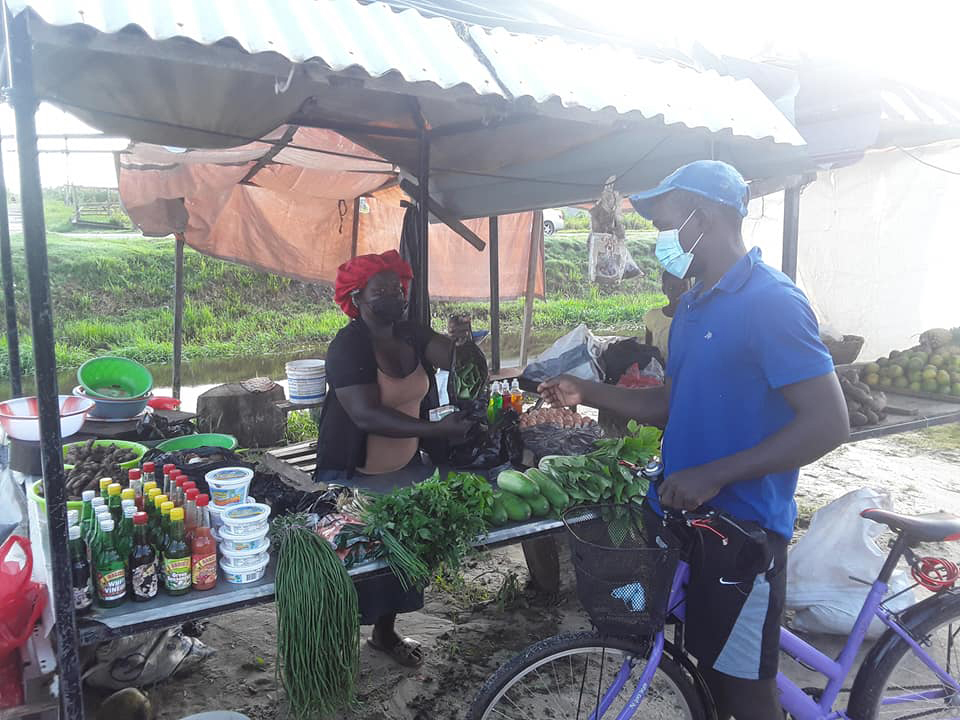It would be difficult to find anywhere across the country a group of farmers and agro processors more resolute, more determined, than the members of the Mocha Arcadia Multipurpose Agriculture Co-operative Society (MAMPA). On Sunday, the group staged its fourth Farmers’ Market this year, the sparseness of the fruits and vegetables on display to the limited numbers of buyers who drifted in and out of the market area over the hours of the event underscoring the impact of, first, the covid-19 pandemic and afterwards, the recent floods on the extent of the bounty that available for sale.
They had turned out, anyway, to honor a commitment, albeit in a limited way though even a cursory glance told the story of a group battling against odds that include an expanse of real estate where the farming takes place but which, all too frequently, is flooded, rendering agricultural production a challenge. The challenge of flooded agricultural plots is blamed (or at least so it seems) on what some say is an indifferent Ministry of Housing and a National Drainage and Irrigation Authority (NDIA) accused of taking a posture that it has other ‘bigger fish to fry. If one is still to secure a full understanding of just why the water remains on the land aback of Mocha for such extended periods it is not difficult to determine that the prospects for the continued growth of this farming enclave are not particularly good except the issue of bringing an end to the drainage challenge is confronted and remedied. Somewhat, perhaps, getting ahead of itself, the cooperative has already been sending strong signals that it needs official support if it is to grow and prosper in a country where, by and large, cooperatives are widely regarded as having failed to make a meaningful socio-economic mark. Several weeks ago this newspaper published a story disclosing what had been represented as the need to create a multi-purpose structure that could serve as much as a storage facility and administrative headquarters for the Cooperative as it would for a permanent marketplace.
Last Sunday’s Market Day, staged against the backdrop of both the covid-19 challenge and the flooding served, in a sense, to remind government that the protracted official inattention to the growth of small businesses has to come to an end. The Market Day should have served as a point of release from the scarcity and high prices of farm produce resulting from the poor weather. Instead, and notwithstanding the obvious determination of the vendors to ‘make a statement,’ it perhaps did more to underscore some of the elements of the flood-related crisis.
If the turnout at Sunday’s Market Day was, frankly, nothing to write home about, it served as testimony to the endurance of the approximately forty (40) vendors who turned to offer their strictly limited quantities of vegetables, fruit, meat, potted plants………..and clothing. The event, unsurprisingly, was, unsurprisingly, a sellout, the outcome underscoring the sparseness of the offerings rather than the generous spending of the visitors to the market.
Setting aside evidence of a commitment on the part of the vendors to the community, however modest the gesture appeared to be, there was evidence too that the limitations placed on the Farmers’ Market by the extant circumstances were not sufficient to cause them to abandon the sense of discipline which the covid-19 pandemic demands. The vendors, under the watchful eye of the Cooperative’s ‘overseers’ had set up their stalls six feet apart on both sides of Dawson street, between Nelson street and Burnham Boulevard. There was, as well, evidence that the organizers were mindful of the need to rigidly enforce the requisite protocols.
Sunday’s Mocha/Arcadia Market Day was hardly much ‘to write home about’ in the context of the farm bounty and the numbers of patrons who turned up for the event. It was, much more, a demonstration of a spirit of community which, over many years, has had to survive and to sustain itself in the absence of anything even remotely resembling a generous measure of official support. Talking with the officials associated with the Cooperative one can sense a considerable concern over what, up until now, appears to have been a strictly limited response to the challenges associated with keeping the organization alive and functioning. The response of the officials to our inquiries suggested that they have come to consider these Market Days as extensions of their responsibility to provide a measure of practical support for the community’s small farmers and Agro Processors as well as to provide a modest supply channel for consumers in the community who must face the wider inflated prices afforded by the challenges, not least the recent flooding, that has been facing the agricultural sector countrywide.











